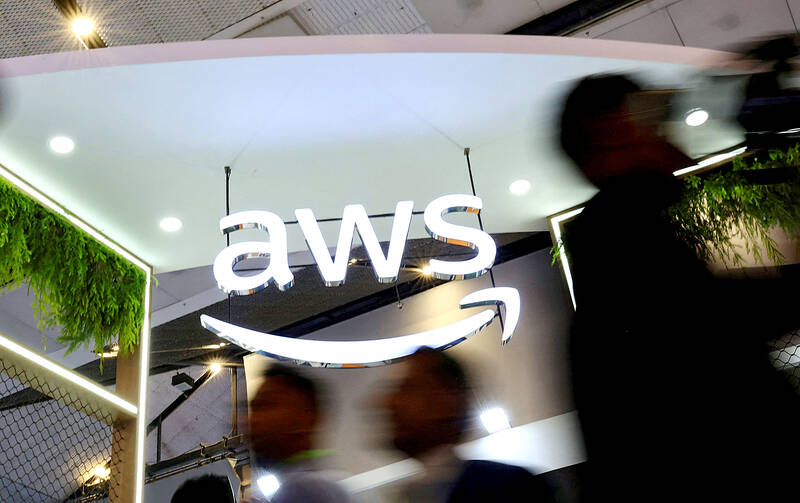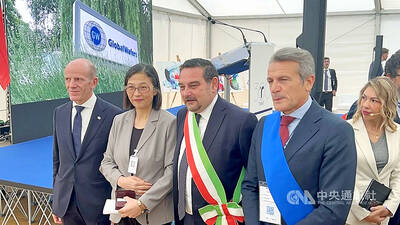Amazon Web Services (AWS), the world’s largest cloud provider, resolved the issues that plagued its services for about 15 hours on Monday, an episode that highlighted how much of the Internet is dependent on the operations of a single company.
In an update on its service health dashboard, the Amazon.com Inc unit said all of its services “returned to normal operations” as of about 6pm New York time.
AWS — data storage, computing power and other building blocks — underpin a large chunk of the Internet, accounting for about one-third of the cloud market.

Photo: Reuters
DownDetector, a Web site that tracks online outages, said in a Facebook post that it received more than 11 million user reports of problems at more than 2,500 companies.
Financial services outfits Venmo and Robinhood Markets Inc, Apple Inc’s music and TV offerings, software companies such as Zoom Communications Inc, Salesforce Inc and Snowflake Inc, food-services giants including McDonald’s Corp and gaming companies such as Epic Games Inc, and even Amazon’s own services, including Alexa and the Ring home security system, were not immune, it said.
Corey Quinn, chief cloud economist with Duckbill, which advises businesses on their cloud spending, said Monday’s outage was likely the worst for AWS since a major disruption in December 2021.
AWS earlier said a digital directory for a key database service malfunctioned, causing cascading failures when software reliant on the widely used data trove was unable to retrieve information. By early Monday New York time, the company said it had identified and fixed the underlying issue, which hit its operations on the US East Coast, AWS’s largest cluster of data centers.
However, as the company worked to fix that issue, engineers found that other subsystems — including one necessary for customers to launch new rented servers — had been hit by the database outage.
Most glitches on major tech systems are fixed quickly. Still, interconnected technology systems have meant that problems at one company can cause catastrophic impacts across the global economy.
AWS leads the cloud computing market, followed closely by Microsoft Corp’s Azure, with Google Cloud in third place. Businesses, governments and consumers worldwide rely on their infrastructure for online activities.
“Major providers like AWS going down represent vulnerabilities in what have become critical infrastructure for organizations and, in some cases, governments globally,” Emarketer Inc senior analyst Jacob Bourne said. “As cloud reliance and workloads expand, these outages could hit industries harder.”
Additional reporting by AFP

RECYCLE: Taiwan would aid manufacturers in refining rare earths from discarded appliances, which would fit the nation’s circular economy goals, minister Kung said Taiwan would work with the US and Japan on a proposed cooperation initiative in response to Beijing’s newly announced rare earth export curbs, Minister of Economic Affairs Kung Ming-hsin (龔明鑫) said yesterday. China last week announced new restrictions requiring companies to obtain export licenses if their products contain more than 0.1 percent of Chinese-origin rare earths by value. US Secretary of the Treasury Scott Bessent on Wednesday responded by saying that Beijing was “unreliable” in its rare earths exports, adding that the US would “neither be commanded, nor controlled” by China, several media outlets reported. Japanese Minister of Finance Katsunobu Kato yesterday also

‘DRAMATIC AND POSITIVE’: AI growth would be better than it previously forecast and would stay robust even if the Chinese market became inaccessible for customers, it said Taiwan Semiconductor Manufacturing Co (TSMC, 台積電) yesterday raised its full-year revenue growth outlook after posting record profit for last quarter, despite growing market concern about an artificial intelligence (AI) bubble. The company said it expects revenue to expand about 35 percent year-on-year, driven mainly by faster-than-expected demand for leading-edge chips for AI applications. The world’s biggest contract chipmaker in July projected that revenue this year would expand about 30 percent in US dollar terms. The company also slightly hiked its capital expenditure for this year to US$40 billion to US$42 billion, compared with US$38 billion to US$42 billion it set previously. “AI demand actually

Jensen Huang (黃仁勳), founder and CEO of US-based artificial intelligence chip designer Nvidia Corp and Taiwan Semiconductor Manufacturing Co (TSMC, 台積電) on Friday celebrated the first Nvidia Blackwell wafer produced on US soil. Huang visited TSMC’s advanced wafer fab in the US state of Arizona and joined the Taiwanese chipmaker’s executives to witness the efforts to “build the infrastructure that powers the world’s AI factories, right here in America,” Nvidia said in a statement. At the event, Huang joined Y.L. Wang (王英郎), vice president of operations at TSMC, in signing their names on the Blackwell wafer to

Taiwan-based GlobalWafers Co., the world’s third largest silicon wafer supplier, on Wednesday opened a 12-inch silicon wafer plant in Novara, northern Italy - the country’s most advanced silicon wafer facility to date. The new plant, coded “Fab300,” was launched by GlobalWafers’ Italian subsidiary MEMC Electronics Materials S.p.A at a ceremony attended by Taiwan’s representative to Italy Vincent Tsai (蔡允中), MEMC President Marco Sciamanna and Novara Mayor Alessandro Canelli. GlobalWafers Chairwoman Doris Hsu (徐秀蘭) said the investment marked a milestone in the company’s expansion in Europe, adding that the Novara plant will be powered entirely by renewable energy - a reflection of its